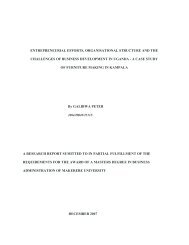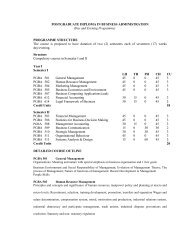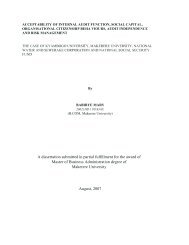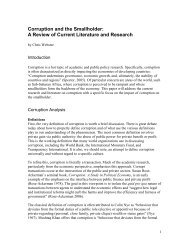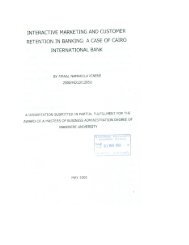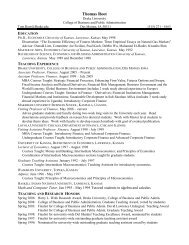13th Annual International Management Conference Proceeding
13th Annual International Management Conference Proceeding
13th Annual International Management Conference Proceeding
You also want an ePaper? Increase the reach of your titles
YUMPU automatically turns print PDFs into web optimized ePapers that Google loves.
two professors used a survey questionnaire, and constructed an index measuring the relative cultural strengths of these<br />
companies. They then evaluated these companies' 1977-1988 financial performance using three different measures,<br />
namely average yearly increase in income, average yearly return on investment and average yearly increase in stock price.<br />
Correlations were used to test the assertion that companies with strong cultures performed better than their weaker<br />
counterparts. Their work concluded that corporate culture could have a significant impact on a firm's long term<br />
economic performance and that corporate culture would probably be an even more important factor in determining<br />
the success or failure of firms in future.<br />
The correlation between corporate cultures and economic performance was further illustrated by the results of the reanalysis<br />
work undertaken by Terrence Deal and Allan Kennedy, the joint authors of the book "Corporate Cultures:<br />
The Rites and Rituals of Corporate Life". They calculated the average performance of the top twenty culturally robust<br />
companies and compared these to ratings for the bottom twenty. The remarkable results showed that the culturally<br />
strong companies averaged 571% higher gains in operating earnings, 417% higher returns on investment and 363%<br />
increase in stock prices respectively than their culturally deprived counterparts over the eleven years.<br />
In so far as SMEs in Kenya are concerned, the concepts of "corporate governance" and corporate culture are still<br />
somewhat foreign to the majority of them. At its most basic, it's described as the personality of an organization. It<br />
guides how employees think, act, and feel. Corporate culture is a broad term used to define the unique personality or<br />
character of a particular company or organization, and includes such elements as core values and beliefs, corporate<br />
ethics, and rules of behavior. Corporate culture can be expressed in the company's mission statement and other<br />
communications, in the architectural style or interior design of offices, by what people wear to work, by how people<br />
address each other, and in the titles given to various employees (Hansen 2006). Few are aware of their importance.<br />
Still less have actual experience of implementing good corporate governance standards or cultivating strong, consistent<br />
corporate culture in their own firm.<br />
IV CORPORATE GOVERNANCE OF KENYAN SMEs<br />
The widespread neglect of the corporate governance practices, with regard to SMEs in Kenya bears some considerable<br />
risks which can be concluded in several points.<br />
1. High staff turnover: This would result to high costs attributed to repeated recruitment, training and replacement<br />
affect the image of the organization and the income level. (Mubibo, 2005)<br />
2. Increase of financial difficulties: Many entrepreneurs lack awareness on where to obtain business finance. This has<br />
been indicated by the study by Ngoze (2003) on Micro Finance Institutions (MFI) type of SMEs which play a<br />
major intervention role in the development of the small and micro enterprise sector in the developing world<br />
today. Several studies (Kenya 1996, Kibas 1995) have shown that one of the prevailing impediments to growth<br />
and expansion by SMEs is lack of credit for both working and capital expenditure. Its accessibility, where it is<br />
available, has been noted as another problem (Kibas and Wasike 2003). Not only bankers and investors look for<br />
properly run SMEs for business and investment, so would overseas and Kenyan SMEs who are looking for<br />
strategic partners with Kenyan SMEs. Overseas SMEs in particular are likely to be very demanding on the<br />
background of their strategic partners. Without any experiences in collaborating with Kenyan SMEs, they would<br />
naturally assess a Kenyan SME in terms of its corporate governance standards and corporate culture, as these are<br />
more easily observable indicators of the extent of openness, integrity, accountability, trustworthiness and<br />
capabilities of a corporation.<br />
3. Loose business opportunities: First, the advent of information technology, particularly e-commerce and Internet,<br />
has cut cross all national boundaries. This means greater and easier access to new markets and new customers, not<br />
only in the Common Market for Eastern and Southern Africa (COMESA) for promoting regional<br />
economic integration through trade and investment, but almost anywhere in the world at very low cost. In the<br />
past, only multinational corporations (MNCs) could afford to establish market presence in places away from<br />
their home grounds. However, with internet and e-commerce, even an SME could be transformed overnight into<br />
an MNC, in terms of market coverage if not in terms of company size or turnover. While SMEs which are<br />
adaptive to these technological changes could successfully ride on the IT superhighway and expand their markets,<br />
those that fail to take advantage of what IT can offer would not just be left behind, but would find their markets<br />
contracting. For a Kenyan SME to be visionary and aggressive SME as opposed to a non-performing one in an<br />
36



